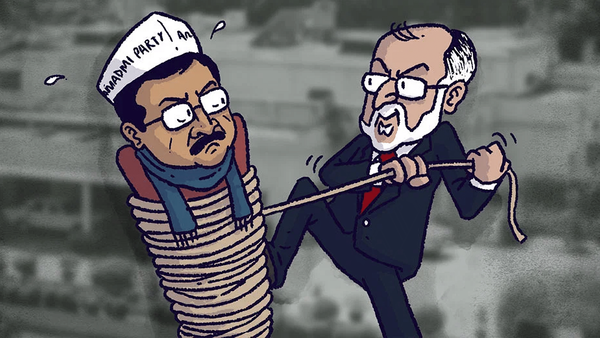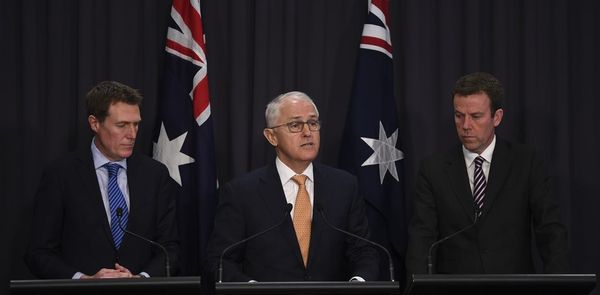
On Monday, first the Chief Minister’s residence, then the Delhi Assembly, and eventually the Lieutenant Governor Anil Baijal’s office stood witness to return of “activist” Arvind Kejriwal. The Delhi chief minister first tore apart the LG in the morning presser and in his speech in the Delhi Assembly, before going to the LG’s office in the evening.
In a letter to Baijal, he said, “This is the first time in the history of independent India that IAS officers have gone on a strike for almost four months. Their act is gross misconduct under the AIS conduct rules.” He further alleged this was the first time that “PMO and Hon’ble LG are instigating an active rebellion against an elected government”. Kejriwal and his ministers, including Manish Sisodia, Satyender Jain and Gopal Rai, went on a sit-in-dharna inside the LG office’s waiting room, demanding that Baijal ask the officers to stop “the partial strike”.
However, Baijal left the office, citing his “pre-scheduled” appointments. The Raj Niwas also issued a statement saying the Delhi CM, deputy CM and the two ministers “remained defiant and continued to pressurise that the officers must be immediately summoned to Raj Niwas and the so-called ‘agitation’ be called off”.
It was the culmination of events that started with the special Delhi Assembly session to discuss the statehood issue. In the three day session, which was extended by a day, Delhi legislators were to discuss, debate and pass the resolution supporting full statehood for Delhi. But they also ended up spending a large chunk of the Assembly’s time in attacking and criticising the Delhi government officers. AAP has found a parallel opposition in the IAS lobby, who have virtually been on a strike-like situation for the past four months.
The modus operandi to attack officers was simple. A legislator would ask a question to a concerned minister. The minister in his response sought the reply from the concerned officer or officers. And later informed the Assembly that the officer has refused to respond to such questions.
Here are the two examples from the special session, convened between June 6 and 11. AAP MLA Saurabh Bhardwaj sought response for his questions from the revenue department. On Monday, revenue minister Kailash Gahlot informed the house, “The revenue department officers have refused to respond to question No 16 and 31 [raised by Bhardwaj].”
Similarly, MLA Surender Singh sought answers from the education department. Education minister Manish Sisodia, responding to the questions, told the house, “When the officers told me they can’t respond to the question [raised in the Assembly], I issued written orders to the education secretary to be present in the assembly at 2 p.m. with appropriate answers. But I cannot see the education secretary or any other representative from the education department.” He further added, “This is open contempt of the Assembly.”
Ever since chief secretary Anshu Prakash alleged that he was manhandled and abused by AAP legislators at the CM’s residence in February, the relationship between the government and its officers has been at odds. The AAP government and its Cabinet had to face embarrassing moments right before the 2018 Budget session: officers refused to cooperate unless the CM himself apologised to the chief secretary, and assured the safety and security of the officers.
After this incident began the saga of Delhi government officers not responding to questions raised by MLAs in the Assembly. The special session was no exception. The AAP legislators asked questions to departments including revenue, education, services, and land and building.
Even on June 11, the concluding day of the session, ministers such as Gahlot and Sisodia pinned the officers down, going on record to say the officials were not responding to the questions being asked. Both Sisodia and Gahlot informed speaker Ram Niwas Goel that despite written orders issued by them, the officers either chose to give no satisfactory answers or refused to respond to the queries raised by the legislators in the house. In fact, Sisodia went on to call it a conspiracy to “weaken” democracy and the Delhi assembly.
It is important to note that the governing party used the floor of the house to attack the officers in a session called exclusively to discuss the statehood issue. The legislators, including deputy CM Sisodia, however framed their statements in a way that supports their demand for the full statehood for Delhi. They also pointed out how the officers remained defiant, and were not responding to the question being raised by those elected by the public.
Importantly, revenue secretary Manisha Saxena along with the education secretary and secretary services were asked to be present in the house in order to respondent to the questions. On June 7, Goel had indicated that if the officers didn’t follow the instructions of the house, he is capable of taking action against them. Saxena moved the Delhi High Court and was exempted from attending the house proceedings.
The vacation judge C Hari Shankar said in the order, “The respondents [the speaker and the house] are restrained from taking any precipitate action or coercive steps based on the impugned communication dated June 7, 2018” till June 13, when the matter would be taken up and heard by the court. On Monday, none of the secretaries mentioned above attended the session.
Newslaundry spoke to a few MLAs who raised questions in this Assembly session. Burari MLA Sanjeev Jha said, “A deadlock in the system has been created by the bureaucracy on the instructions of the LG, who is working on the direction of the Prime Minister’s office. The time has come that Delhi voters will have to take the streets to demand full statehood.”
AAP spokesperson Saurabh Bhardwaj was asked whether the floor of the house was used by the AAP legislators to attack its own officers. He said, “There was no attack on officers. In Vidhan Sabha, there is question hour, where all MLAs expect that the answers from the government should come.” The former transport minister added, “The ministers are saying on record that they want the officers to respond. And the officers under the pressure from the LG are refusing to respond to questions on big ticket corruption. This is the obvious reason for the unhappiness of the leaders. ”
The officers have arguments in their defence as well. One of the senior-most Delhi government officials told Newslaundry, “In this session and the previous session, the officers were called to the Assembly. In the previous session, there were attempts to name and shame the officers. There have been threats of taking coercive action against us.”
When asked why the officers didn’t respond to questions pertaining to departments such as the revenue and the services, the officer said, “There is a High Court case which says that land, public order, and the police and the services are reserved subjects. These questions to the revenue department pertained to land, which is a reserved subject. Similar the questions related to services. The concerned officers have told the minister [Gahlot] not once but thrice that they cannot respond to such questions.”
Also, the Ministry of Home Affairs circular dated March 19, 2018 restricts the officers from answering questions related to these issues.
Meanwhile, the IAS officers’ association issued a statement to counter Kejriwal’s claims. In the statement, it said, “It is unfortunate that the CM and the ministers are making unwarranted and baseless allegations that IAS officers are on strike.” The officers claimed that no officer working with the Delhi government “is or has been on strike subsequent to the unfortunate assault of the chief secretary at 12 midnight on 19.02.2018 at CM’s residence by MLAs in the presence of Chief Minister and Dy. Chief Minister”.
However, they maintained that the officers are not attending routine meetings called by the ministers and the CM as they have failed to assure the safety of the officers.
Both AAP and Kejriwal are claiming that officers have met the ministers individually and said that they don’t have any issues with the government. However, another senior Delhi government official refuted these claims. On conditions of anonymity, she said, “I don’t think there is any truth to the CM’s claim that officers have met him. If he is making such claims, let him name the officers.”
Criticising the AAP government’s move to attack the officers by using powers of the Assembly, the senior IAS officer with the government said, “The Delhi assembly is being used as a tool for the executive. Whatever powers they [the AAP government] don’t have, they want to grab them from the back door.”
Newslaundry is a reader-supported, ad-free, independent news outlet based out of New Delhi. Support their journalism, here.










